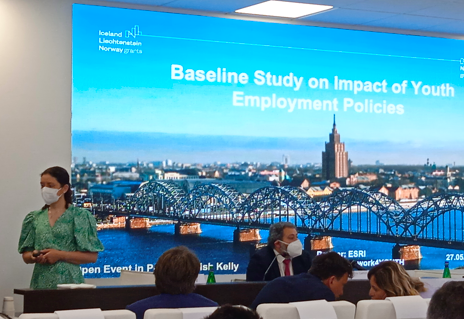Our Baseline Study on the Impact of Youth Employment Policies, along with its executive summary, is now through the outputs section at http://cowork4youth.org. The first of 14 outputs of the Cowork4YOUTH project, the Baseline Study collects and presents descriptive evidence about the impact of youth employment policies for the period 2008-2020 across the four countries under study, Spain, Italy, Ireland and Greece. More specifically it focuses on two types of non-metropolitan regions: a) tourism-dependent, island or remote coastal regions, and b) regions facing energy transition, decarbonisation or intense industrial decline. Cowork4YOUTH focuses on young NEETs (Not in Employment, Education or Training) between the ages of 25 and 29, with particular attention, wherever possible, to young mothers and the long-term (for 12 months or more) unemployed.
In order to understand the incidence and composition of NEETs, cross-country data and statistical evidence for NEET rates and youth employment over time were used to create a framework. This is accompanied by an analysis of the progression of relevant policies in each country.. The impact of youth employment policies is examined through 5 indicators: a) employment rates; b) unemployment rates; c) long-term unemployment rates; d) NEET rates; and e) inactivity rates. Moreover, youth employment shares were categorised in 4 economic sectors, that correspond to the region types under examination: a) accomodation and food services, and b) arts and entertainment, for the tourism-dependent regions; c) manufacturing, and d) electricity, for industrial decline and energy transition regions.
Except for the descriptive evidence that the baseline study shows, there are also two other results produced: a) an outline of the economic context for each country under study, which illustrates the situation at the beginning of the Great Recession of 2008, during the peak of the crisis (2009-2013), the period of recovery (2014-2019) and finally the outburst of the COVID-19 pandemic in 2020; and b) an overview of the youth employment policies implemented in these four countries from 2008 to 2020.
A key finding is that while in essence all countries share more or less the same issues relating to youth employment, there is, however, a distinct variation in the composition of these challenges. Moreover, in many cases the study’s findings re-confirm imbalances between men and women; a finding that shows that the divisions’ character is not only spatial, but social as well. Consequently, questions arise about balancing policies between social and spatial factors, as well as social cohesion.
The main goal of the study is to provide a starting point for policy analysis, while at the same time putting into context the youth unemployment issue in the areas under study. The Baseline Study is a key point for Cowork4YOUTH, as the complementarity of its output structure means that this study will function as the foundation for outputs to come.
For more information, visit the Cowork4YOUTH website:


